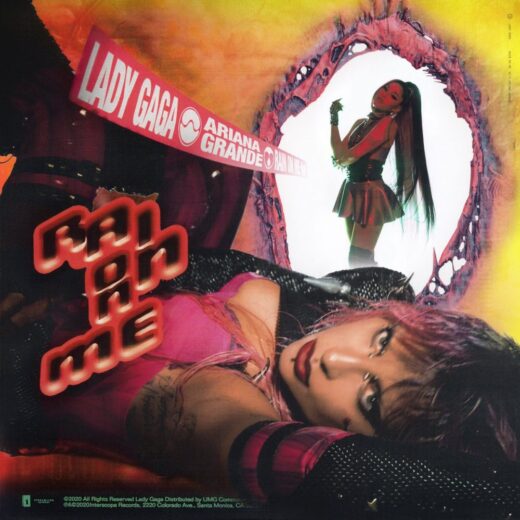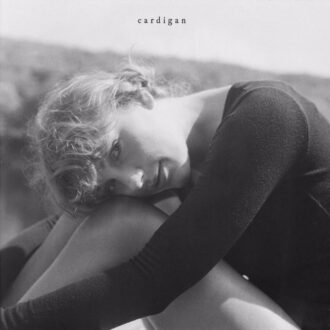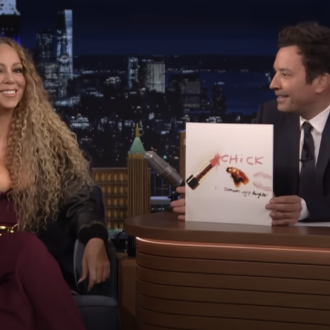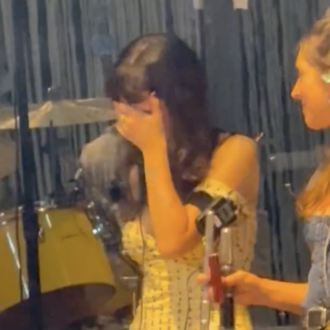In The Number Ones, I’m reviewing every single #1 single in the history of the Billboard Hot 100, starting with the chart’s beginning, in 1958, and working my way up into the present. Book Bonus Beat: The Number Ones: Twenty Chart-Topping Hits That Reveal the History of Pop Music.
At least in theory, dance music is about collective catharsis — the feeling that you can only get when you’re packed into a room with a whole bunch of other people and you’re all losing it together. During lockdown, that feeling was a myth and a memory. So how do you reckon with the idea that 2020 turned out to be a pretty great year for dance music? It was weird! Pop stars made big, clubby records, and then they panicked when they realized that they would release those albums into a world where nobody was out in clubs. But how many of us regularly experience dance music in a club context, anyway? I don’t. I wish I did, but I’m middle-aged as fuck, and I’m not outside like that. I still love dance music. Maybe that’s how the rest of the world felt in 2020. People couldn’t go out and party — or, if they did, it was generally frowned upon. They still listened to a whole lot of dance music, possibly because that music connected them to things that couldn’t be in lives at that moment.
The big, obvious dance-pop record of 2020 was Dua Lipa’s sleek and majestic Future Nostalgia, a collection of top-shelf bangers that might’ve landed even harder in lockdown than they would’ve otherwise done. (Two Future Nostalgia tracks, “Don’t Start Now” and “Levitating,” both peaked at #2. “Don’t Start Now” is a 9, and “Levitating” is an 8.) Singers like Kylie Minogue and Jessie Ware also put out cult-favorite disco-revival albums; the Minogue record was literally just called Disco. And Lady Gaga, perhaps the artist most responsible for the circa-2010 EDM-pop boom, returned to club music in a big way after nearly a decade of playing around in other styles. She also teamed up with a molten-hot Ariana Grande and made an event-song that eked out a week at #1 in that constantly shifting Hot 100 environment.
“Rain On Me” doesn’t endure as one of the definitive smashes from either Gaga or Grande. But compared to the many lightweight, forgettable hit collaborations of that moment — including one from Grande herself — “Rain On Me” still stands out easily. Gaga and Grande intentionally made “Rain On Me” into an anthem about purging trauma through body movement. They didn’t know that they were supplying a demand for crying-in-the-club music at a time when people could only think fondly about past club experiences, but that demand existed. Maybe that’s why “Rain On Me” feels more like an actual hit song, less like a distant mirage.
Lady Gaga’s stardom looked like it was on the wane before “Shallow,” the Bradley Cooper soundtrack duet that took her back to #1 in 2019. Starring alongside Cooper in A Star Is Born, Gaga showed that she could really act and that her pop-stardom skills could be useful in all kinds of different contexts. Gaga got nominated for the Best Actress Oscar, and I thought she should’ve won. She didn’t get that one, but “Shallow” won her the award for Best Original Song. She could pretty much do whatever she wanted after that, and what she really wanted to do was make a slammin’ dance-pop record.
Lady Gaga was already messing around with ideas for a new album before A Star Is Born. In the wake of the movie’s success, she played a cocktail-jazz Las Vegas residency, got sober, and broke up with her fiancé, the talent agent Christian Carino. She also started formulating a full-length album statement with BloodPop, the adventurous, club-friendly producer who has already been in this column for his work on Justin Bieber’s “Sorry.” (BloodPop’s only Hot 100 hit as lead artist, the Bieber collab “Friends,” peaked at #20 in 2017.) Gaga hadn’t gone all-in on club music since Artpop, the ambitious 2013 album that effectively ended her early imperial streak. With her Chromatica LP, Gaga wanted to make music that reckoned with difficult life experiences, and she wanted to make sure that it brought the boom. Together, Gaga and BloodPop figured out how that would work.
Working on Chromatica, Lady Gaga and BloodPop brought in a ton of collaborators from the dance world. Big-deal DJs like Skrillex, Axwell, Ingrosso, and Madeon worked on tracks, and so did all-star pop songwriters like Max Martin, Ryan Tedder, and Justin Tranter. Lyrically, the songs on Chromatica are mostly vague self-help koans about getting through personal hardships. This was pretty early in a wave of heavily therapy-coded pop-star records, and that whole thing wore out its welcome long before those records stopped coming out. But Chromatica gets away with it by putting that stuff into a sleek, intentionally ridiculous sci-fi context and by subordinating those lyrics to the almighty thump of the production. Gaga co-wrote lead single “Stupid Love” with a team that included BloodPop, Max Martin, and Tchami, the French producer who specializes in a possibly made-up genre that he calls future house. “Stupid Love” is a big, fun song that didn’t make a huge splash on the Hot 100. It came out just before lockdown and debuted at #5 but then quickly slid down the chart. (It’s an 8.)
Lady Gaga didn’t bring in too many featured guests for Chromatica, but all of the collaborations felt like actual events. On “Sour Candy,” Gaga teamed up with the K-pop girl group Blackpink when both Blackpink and K-pop in general were surging. Their sound fit the futuristic aesthetic that Gaga was cultivating, and the song slaps pretty hard. (“Sour Candy” peaked at #33. Blackpink’s highest-charting single as a group, the 2020 Selena Gomez collab “Ice Cream,” peaked at #13.) “Sine From Above,” meanwhile, is a duet with Elton John, an artist who has appeared in this column a great many times. It’s pretty fun to hear Elton John singing on a track that then explodes into jagged jungle breakbeats. But the biggest and most important of Gaga’s Chromatica guests, at least in that cultural moment, was Ariana Grande.
Lady Gaga and Ariana Grande never worked together before “Rain On Me,” but they’re both big-voiced theater nerds who sound great over dance beats and went through turbulent things in the public eye. (It didn’t happen until later for Grande, but both of them also got nominated for Oscars for their first big film roles.) With “Rain On Me,” Grande came close to replacing herself at #1. Two weeks before “Rain On Me” debuted atop the Hot 100, Grande’s offensively boring and instantly forgotten Justin Bieber duet “Stuck With U” was sitting on top. Gaga and Grande both had (and still have) extremely vocal and motivated online stan armies, so the combination of both artists felt a little bit like a label-mandated merger, an obvious way to juice a track’s chart numbers. But “Rain On Me” doesn’t feel anywhere near as forced as so many of the other big collaborations that topped the Hot 100 in 2020. It feels like a relatively intuitive union of two kindred spirits.
You could look at Ariana Grande’s presence on “Rain On Me” as an insurance policy for Lady Gaga. It would be pretty embarrassing if Gaga’s first big pop record after A Star Is Born didn’t have a big hit on it, and Grande’s participation was enough to ensure big-hit status. In her Chromatica promo cycle, though, Gaga made a point to talk about how Grande went out of her way to befriend her. Gaga and Grande both have co-writing credits on “Rain On Me,” and Gaga has said that the song came out of the two of them sitting down to talk about their lives. They had a bunch of help from other writers, too.
BloodPop co-produced “Rain On Me” with Matthew Burns, a British dance DJ who has made a few UK hits and who goes by just plain Burns. (He spells the word in all caps, but I’m not doing that.) BloodPop and Burns both have writing credits on “Rain On Me,” and a bunch of other people do, too. One of them is Rami Yacoub, the Swedish-Palestinian songwriter and producer who came up alongside Max Martin and who’s been in this column for working on Britney Spears’ “…Baby One More Time” and *NSYNC’s “It’s Gonna Be Me.” Nice to see that guy again! Another is Nija Charles, a New Jersey-born writer who’s still mostly known for working with rappers and R&B singers. We’ll see more of her work in this column.
Gaga’s “Stupid Love” collaborator Tchami has a writing credit on “Rain On Me,” as does the German dance producer known as Boys Noize. I just saw that guy open for Nine Inch Nails, and he came up on the mini-stage during part of NIN’s set to help them rework some of their tracks into throbbing synth-jams. It was cool as fuck. After that, I think I can finally remember where he puts the S in his name and where he puts the Z. I struggled with that for a long time. So many typos in so many blog posts. I don’t know what specific things that all these different songwriters brought to “Rain On Me.” At least some of the credited writers are known more as producers than as writers, but they don’t have production credits on the track. Maybe those dance producers were just floating around, throwing out ideas for different tracks.
“Rain On Me” started out as an acid house demo track from BloodPop. In an Entertainment Weekly making-of story, Burns says that he tinkered with the song to try to make it fit the rest of the record. Burns wanted “Rain On Me” to evoke the sound of Y2K-era French filter-disco, and he had a breakthrough when he tried playing the bassline from Gwen McRae’s 1979 disco track “All This Love That I’m Givin’,” which the French duo Cassius had already sampled on their 1999 hit “Feeling For You.” On “Rain On Me,” that bassline is replayed, not sampled, but that was enough to score a songwriting credit for “All This Love That I’m Givin'” writer/producer Betty Wright. Wright actually died in 2020, just a couple of weeks before “Rain On Me” came out. I wonder if she knew about that sample before she passed. (Wright’s highest-charting single as an artist, 1972’s “Clean Up Woman,” peaked at #6. It’s an 8. Gwen McRae’s highest-charting single, 1975’s “Rockin’ Chair,” peaked at #9. It’s a 7. McRae’s husband George has been in this column.)
“Rain On Me” really does have some of that French filter-disco feeling. It sounds like a computer-generated car speeding down a computer-generated highway, into the computer-generated sunset. “Rain On Me” starts out as a breakup song, Lady Gaga wailing about how you didn’t even meet her limited expectations. The swirling voice-echo samples and pianos and handclaps all ramp up dramatically. After a drumroll, Lady Gaga delivers the song title with theatrical drag-queen verve: “Rain! On! Me!” It goes right into a deeply satisfying beat-drop, a bouncing squelch that would’ve sounded fantastic at an actual 1999 rave. I didn’t go to many of those things, but I still remember the rhapsodic reaction when “Music Sounds Better With You” came on. If “Rain On Me” wants to evoke that, it’s a good thing to evoke.
Lady Gaga and Ariana Grande have tremendously different vocal styles, but they complement each other on “Rain On Me.” Gaga is all muscle, pounding her way through the center of the track. When Grande arrives on the second verse, she’s soft and feathery. You can hear that the two big stars were actually in the studio together, that they weren’t just emailing vocal stems to each other’s producers. Together, they find a real sense of chemistry, with Grande’s vocals drawing pretty curlicues around Gaga’s booming exhortations. I like how Grande echoes one of Gaga’s “Rain! On! Me!” chants, getting a little call-and-response going. Gaga and especially Grande are used to stacking their own harmonies on their tracks, and it’s fun to hear both of them do it on “Rain On Me.” And that big beat-drop keeps coming back again and again, never getting old and coming pretty close to overshadowing both divas.
The “Rain On Me” lyrics are pretty boilerplate Hallmark-card stuff about giving yourself over to hard experiences and getting through them. But this is dance music, and dance music lyrics can be vague aphorisms. Maybe they’re supposed to be vague aphorisms. Meaningless words have a way of taking on more weight when they’re belted out by virtuoso howlers over thudding beats. The line about “I’d rather be dry but at least I’m alive” can almost sound wise if hit hits you at the right moment. I like the idea of facing a tough time by just gutting up and pushing through it, knowing that you’re strong enough to get past a darkness and that it won’t last forever. I don’t much like the idea of motivational-speaker mush in pop songs, but Gaga and Grande make it work by wailing it out with authority. The best house divas were always the gospel singers. Gaga and Grande aren’t gospel singers, but both of them at least know how to mess around with R&B, and that knowledge pays off on this track.
Gaga and Grande filmed the “Rain On Me” video in LA just before the pandemic hit, but you could convince me that they made it during lockdown. The director was Robert Rodriguez, who worked with Lady Gaga on her cinematic debut Machete Kills. When he started out making his 1992 feature El Mariachi for no money, Rodriguez became one of the mythic directors of the ’90s indie boom. Around the time that he started making his Spy Kids franchise, though, Rodriguez got really into playing around with CGI green-screen business, and that’s what he does on “Rain On Me.” (In 2020, Rodriguez also directed the superhero-kids movie We Can Be Heroes, which is entirely CGI green-screen business, to the point where it’s hard to look at.) The “Rain On Me” clip takes place in a standard Blade Runner-style cyberpunk dystopia, rendered entirely in CGI green-screen. There’s some kind of storyline, but it’s mostly garish dance routines shot in unflattering ways. I do like how both Gaga and Grande wear extreme versions of outfits that girls wore to raves in 1999, right down to Grande rocking those tiny Tinkerbell wings.
“Rain On Me” debuted at #1 and got raves from critics, but it was out of the top 10 after a few weeks. The single ultimately went double platinum, and Chromatica went platinum. The numbers weren’t huge, but nobody was embarrassed. Since then, “Rain On Me” has racked up more than a billion Spotify streams. It’s a legitimately big song. Gaga had a huge rollout planned for the Chromatica album, but the pandemic made most of it impossible. She had to delay her Chromatica Ball stadium tour for two years, and she couldn’t do most of the TV performances that she wanted to do. But she did a whole 10-minute medley during the 2020 VMAs, and Ariana Grande came out to sing “Rain On Me” with her. Everyone wore masks, and it wasn’t quite as awkward as you might expect.
I hear “Rain On Me” as a fun, solid dance-pop track but not exactly a classic. That was enough. Based on that, “Rain On Me” stood out in the bleak-ass 2020 pop landscape. Plenty of other people were more bullish than me. My Stereogum colleague Chris DeVille named it as his favorite pop single of the year, and he wasn’t the only one. None of the other Chromatica songs really hit. In 2021, there was a Chromatica remix album, and it had a fun “Rain On Me” reworking from the glitchy dance experimenter Arca.
Gaga moved on to other things. She sang the National Anthem at Joe Biden’s 2021 inauguration, and she teamed up with her old friend Tony Bennett for Love For Sale, their second and final album of standards. She played the lead in Ridley Scott’s entertainingly trashy House Of Gucci. That movie didn’t land as hard as A Star Is Born. Gaga tried so hard to make her Italian accent as cartoonish as possible. Everyone else in the film did the same thing. People talk about House Of Gucci as a dud these days, but I had a good time watching it. Gaga’s next big film role would turn out to be much, much worse.
Lady Gaga’s first big single after Chromatica was “Hold My Hand,” the end-credits ballad from the 2022 blockbuster Top Gun: Maverick. I think that song was supposed to become the new “Take My Breath Away,” but it didn’t happen. Gaga earned herself another Best Original Song Oscar nomination for that song, but she deservingly lost to “Naatu Naatu,” the showstopper from RRR. They should’ve given RRR everything at that Oscars. “Hold My Hand” didn’t even become the biggest hit from the Top Gun: Maverick soundtrack. That turned out to be OneRepublic’s “I Ain’t Worried,” the sequel’s equivalent to “Playin’ With The Boys.” (“I Ain’t Worried” soundtracked the shirtless beach football scene instead of the original’s shirtless beach volleyball scene, and it peaked at #6. It’s a 4.) In a surprise twist, “Hold My Hand” also wasn’t the biggest Lady Gaga hit of 2022.
“Hold My Hand” peaked at #49. That same year, someone on TikTok edited the dance scene from the Netflix show Wednesday to a sped-up version of Gaga’s 2011 track “Bloody Mary,” and that song took off enough to reach #41 more than a decade after its release. It wasn’t even the song that Jenna Ortega danced to in the actual Wednesday scene! The scene, which ruled, was set to the Cramps classic “Goo Goo Muck.” The Cramps should’ve had that chart bump! Here, look:
But the Lady Gaga/Wednesday association continues to this day. Wednesday, like so many other hit streaming shows, takes fucking three years between seasons. When it finally came back just recently, Gaga was stunt-cast as a teacher, and she just released her new single “The Dead Dance” on the show’s soundtrack. Look, Lady Gaga is good at being a pop star. She knows how to milk a moment. When “Rain On Me” came out, Gaga was over a decade into her run. She needed a big-deal duet partner to score a #1 hit, but she got there. Amazingly, Gaga still hadn’t released what might now be her biggest hit. That song was another duet, and you probably already know which one. We’ll see Lady Gaga in this column again. We’ll see Ariana Grande, too.
GRADE: 8/10
BONUS BEATS: The Norwegian singer-songwriter Sondre Lerche ends every year by sending Stereogum a cover of a pop song from that year. It’s a very cool tradition, and we’re honored that he keeps doing it. In 2020, Lerche sent us his take on “Rain On Me.” Here it is:
The Number Ones: Twenty Chart-Topping Hits That Reveal The History Of Pop Music is out now via Hachette Books. I never asked for a free ride, I only asked you to buy the book.




